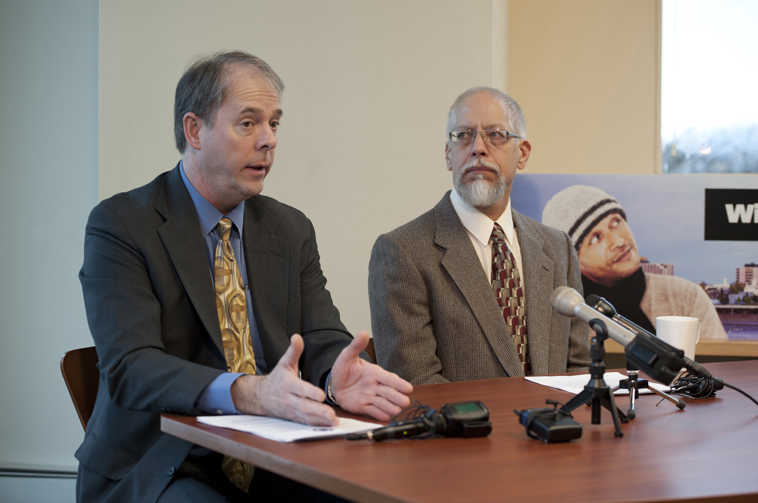JUNEAU — Alaska on Tuesday became the third U.S. state to legalize marijuana. But the historic day passed with little public acknowledgement in a state with a savvy marijuana culture that has seen varying degrees of legal acceptance of the drug for 40 years.
Supporters said the day was a milestone, comparing it to the end of Prohibition. But unlike in Colorado and Washington state, there were no street parties and public smoking displays in Alaska’s biggest cities.
Dolly Fleck-Phelps, a Kenai resident with an ancillary marijuana business, said she thought people would look back on the day as a turning point for Alaska. “Absolutely this is history in the making,” Fleck-Phelps said. “This is the opening of the door. Now it’s time for the real work to begin.”
Legalization marked the end of a 43-year political battle for Bill Parker, 70.
The Anchorage man, who was listed as a sponsor of the initiative, first banded together with a group of young Democrats elected to the state House of Representatives to introduce a legalization bill in 1972. “Gee, there weren’t enough votes to worry about,” the retired deputy commissioner of corrections said.
Parker’s hopes for legal weed dwindled as he saw Alaska become more Republican and more conservative over the years. He said perhaps the marijuana vote marks the end of that pendulum swing.
Now that pot is legal, Parker is ready to take a pause to enjoy the moment, but he said he won’t stop fighting.
“Well, it makes me feel good. It’s not over, of course. The initiative passed by between 5 and 6 percent, so 40 some percent of the people voted against it. Not all of them are ready to lay down and go along,” Parker said.
He plans to meet with other initiative backers for laid-back celebrations Tuesday evening. “I think there’ll be marijuana, and I think for the first time people won’t have to feel like criminals when they use it,” Parker said.
Alaska has had a complicated history with marijuana over the years. The Alaska Supreme Court in 1975 said personal marijuana possession was protected under the state constitution’s right-to-privacy clause. In 1998, voters legalized medicinal marijuana. But over the years, state lawmakers twice criminalized any possession, creating an odd legal limbo, and never created rules for medical marijuana dispensaries to operate.
Placing Alaska in the same category as Washington state and Colorado with legal marijuana was the goal of the pro-pot coalition that included libertarians, rugged individualists and small-government Republicans who prize the privacy rights enshrined in the Alaska state constitution. Legalization is expected in Washington, D.C., on Thursday.
As of Tuesday, adult Alaskans can not only keep and use pot, they can transport, grow it and give it away. A second phase, creating a regulated and taxed marijuana market, won’t start until 2016 at the earliest. That’s about the same timeline for Oregon, where voters approved legalizing marijuana the same day as Alaska did. But the law there doesn’t go into effect until July 1.
Police throughout Alaska were prepared to hand out $100 citations for anyone caught smoking pot in public, but departments stretching more than 1,100 miles from Nome on the state’s western coast to Juneau in the southeast panhandle hadn’t issued a ticket during the day.
“We haven’t even received a call or complaint about anybody doing it,” said Steve Goetz, deputy chief for the University of Alaska Fairbanks police department.
Juneau resident Ralph Jackson said he thought the mellow response to legalization was a testament to pot’s effects— people are generally far more mellow when high than when they consume other drugs or alcohol, he said.
“It’s a medicinal herb God has put on this planet,” Jackson said Tuesday at Juneau’s Marine Park.
Others remained concerned on Tuesday about the details not yet worked out regarding legalization. When the public voted last November to legalize marijuana use by adults in private places, voters left many of the details to lawmakers and regulators to sort out.
Elisabeth Schafer, a Sitka resident visiting Juneau for work, said she was worried about the state developing a workable system of regulations.
“I just wish we had waited longer as a state,” Schafer said. “I don’t want to blaze the way for other states.”
Among the questions remaining on Tuesday were what public places consumption was prohibited in, and how the regulations for a new commercial industry would look.
The initiative bans smoking in public, but it doesn’t define what that means, and lawmakers left the question to the alcohol regulatory board. There were missteps even as the board decided pot can’t be smoked in places generally accessible to the public, like parks, schools or on the street in Alaska.
Board members met via a teleconference Tuesday, but it started late because organizers gave out the wrong telephone number. The call originated from the board’s Anchorage office. However, a locked gate blocked access to the meeting site.
Voters in Washington, D.C., also legalized marijuana in the November election, and it was set to become legal Thursday after congressional attempts to block it failed. Adults in the nation’s capital can possess up to 2 ounces, but Congress has forbidden sales of pot there. Public use is prohibited. Washington state and Colorado voters legalized marijuana in 2012 and sales have started there.
The Alaska pro-marijuana group anticipates more states will begin legalizing pot. “I think we’ve reached a tipping point on people’s thinking about marijuana in this country,” said Tim Hinterberger, chair of the Campaign to Regulate Marijuana Like Alcohol.
Associated Press reporter Mark Thiessen in Anchorage contributed to this report.


